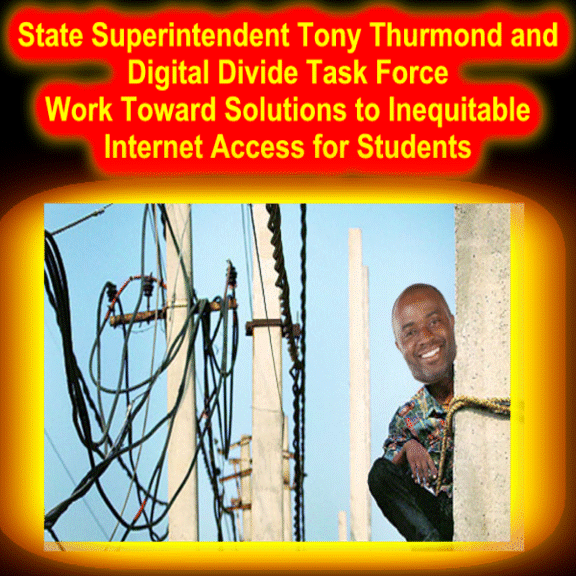SSPI Works Toward Internet Access for Students - Year 2020 (CA Dept of Education)
State Superintendent Tony Thurmond and Digital Divide Task Force Work Toward Solutions to Inequitable Internet Access for Students
SACRAMENTO—State Superintendent of Public Instruction Tony Thurmond and state leaders serving on the Closing the Digital Divide Task Force continued their work today on behalf of California’s most vulnerable students and families who continue to experience barriers to internet access despite calls for providers to expand their services.
During the task force’s latest hearing, Thurmond and members heard testimony from advocates for students living in urban and rural areas, who described continued inequities that stand to put California’s most at-risk learners further behind. During the hearing, representatives from internet service providers were asked to respond to concerns raised, including limited or no service in specific zip codes, “free” internet offers that require costly long-term contracts, mandatory deposits, and other constraints to access.
“We must find solutions to connect our most vulnerable students, many of whom live in underserved, low-income neighborhoods or rural areas and already experience numerous barriers to academic success,” said Thurmond. “The testimonials we heard today from parent and student advocates, and the challenges they continue to face accessing reliable and affordable internet connections, is troubling. We agree with today’s speakers that a student’s ability to access the tools necessary for success should not be determined by their zip code.”
The task force heard testimony from the following speakers:
- Ryan Smith, Chief External Officer, Partnership for Los Angeles Schools
- Stephanie Hernandez, Manager, Parent Leadership and Advocacy, Partnership for Los Angeles Schools
- Anna Hasselblad, Public Policy Director, United Ways of California
- Sunne McPeak, Chief Executive Officer, California Emerging Technology Fund
The task force, co-chaired by Senator Connie Leyva (D-Chino), has held multiple hearings and asked that internet service providers offer free guest access to all California students and do more to expand and promote their services to those in need.
“As the task force continues its important work to eliminate the technology gaps faced by far too many students in California, I am pleased that our ever-increasing partnerships with stakeholders—including internet service providers—are resulting in important momentum and commitments that will help to address the digital divide in our state,” Leyva said. “The current pandemic has made clear what we all already knew: the digital divide is real and largely impacts students in poor and/or rural households and communities. I am confident that the work we are doing will continue to bear fruit since all California students, regardless of their household income or where they may live, deserve nothing less than true and ongoing digital access.
Joining State Superintendent Thurmond and Senator Leyva on the task force are Senator Mike McGuire (D-Healdsburg), Assemblymember Cecilia Aguiar-Curry (D-Winters), Assemblymember Autumn Burke (D-Inglewood), Assemblymember Eduardo Garcia (D-Coachella), Assemblymember Miguel Santiago (D-Los Angeles), and Assemblymember Jim Wood (D-Santa Rosa).
# # # #
Tony Thurmond — State Superintendent of Public Instruction
Communications Division, Room 5602, 916-319-0818, Fax 916-319-0100
SSPI Works Toward Internet Access for Students - Year 2020 (CA Dept of Education)









 “The best thing for being sad,” replied Merlin, beginning to puff and blow, “is to learn something. That’s the only thing that never fails. You may grow old and trembling in your anatomies, you may lie awake at night listening to the disorder of your veins, you may miss your only love, you may see the world about you devastated by evil lunatics, or know your honour trampled in the sewers of baser minds. There is only one thing for it then — to learn. Learn why the world wags and what wags it. That is the only thing which the mind can never exhaust, never alienate, never be tortured by, never fear or distrust, and never dream of regretting. Learning is the only thing for you. Look what a lot of things there are to learn.”
“The best thing for being sad,” replied Merlin, beginning to puff and blow, “is to learn something. That’s the only thing that never fails. You may grow old and trembling in your anatomies, you may lie awake at night listening to the disorder of your veins, you may miss your only love, you may see the world about you devastated by evil lunatics, or know your honour trampled in the sewers of baser minds. There is only one thing for it then — to learn. Learn why the world wags and what wags it. That is the only thing which the mind can never exhaust, never alienate, never be tortured by, never fear or distrust, and never dream of regretting. Learning is the only thing for you. Look what a lot of things there are to learn.”


